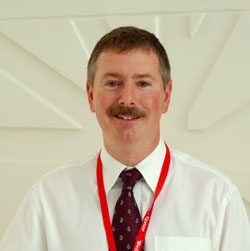Identifying "opportunities for synergism"
Vice Provost aims to build collaborative effort among Cornell's institutions

Dr. Richard Coico
As he settles into his new role as Vice Provost for Inter–Campus Affairs, Richard Coico, Ph.D., plans to build on and expand the links already established between Cornell University in Ithaca, its Weill Cornell Medical College in New York City (WCMC) and WCMC–Q.
This newly created post is intended to further the University’s effort to develop educational and research collaborations among faculty and students at its many institutions.
"There are treasures waiting to be discovered in all the institutions of the University, including WCMC–Q," he says. "Clearly, a need was identified to create a position under the auspices of the University that would serve as a principal liaison between the different institutions."
Although he will be based for most of the year in the U.S., Dr. Coico — who is also professor of microbiology and immunology education at WCMC — will be a regular visitor to the Medical College in Doha, where he is course director for Host Defenses, a first–year basic science course. So he is particularly well placed to bring this geographically most far–flung of Cornell’s major institutions closer to the home campuses.
Dr. Coico brings a wealth of experience of teaching and research to his new posts: He was previously professor and chairman of the Department of Microbiology and Immunology at the City University of New York Medical School. There is also a close connection to Cornell University, since his wife, Dr. Lisa Staiano-Coico, formerly a senior faculty member at WCMC, is now Dean of the College of Human Ecology at Cornell in Ithaca.
Research - an engine for changeResearch has been fundamental to the growth of collaborative enterprise: "As research has evolved, it has become more inter–disciplinary in approach. Biomedical research now incorporates such things as computational methods, structural biology, and genomic and proteomic approaches to solving problems. In addition, it is often the case that expertise in physics and chemistry is critical to contemporary biomedical research programs. Clearly, a team approach integrates all the necessary scientific elements that make problem-solving possible."
"In addition, there has been a convergence of strategies supported by the government — particularly the National Institutes of Health — a strong proponent of multi–disciplinary research, and the University’s effort to bring the campuses closer together."
The push towards collaboration may bring faculty and students from many different disciplines into contact with one another: social scientists with medical ethicists, for example. "There are a lot of opportunities for synergism between the campuses," Dr. Coico says.
Already, Cornell and WCMC have established mechanisms for collaborative research, including faculty retreats and conferences, the Linkage Program for graduate students and the Tri–Institutional Research Program at WCMC, Rockefeller University and Memorial Sloan–Kettering Cancer Center. And once the research program at WCMC–Q is underway, Dr. Coico believes that the Medical College in Qatar will be drawn more closely into the network.
Working together in cyberspaceTechnology plays a central role in keeping the lines of communication open. Already, researchers in a wide variety of academic disciplines use electronic communications to work with colleagues - wherever they may be - and Cornell has done much to facilitate inter-campus links by providing essential infrastructure.
"Building bridges is fine," he notes, "but a bridge still leaves the gap between places. We live in a world where virtual networking creates so many opportunities to have people interact and work together, though they are physically thousands of miles apart: the technology now allows us to do this. Cornell has facilitated these advances by creating venues where people can sit in a room and talk to colleagues on the other side of the world."
WCMC-Q students "the best ambassadors"However, visits to the institutions and face-to-face meetings with faculty and students remain important. "They give me a good bird’ eye view of what’s happening, and allow me to meet the players and facilitate interactions any way I can," Dr. Coico comments.
Even at this early stage, he identifies some key strengths at WCMC-Q: the working environment is professional, the medical students serious in their approach to their work, and the country peaceful.
And he is discovering the culture of the region: "It’s very different from what you may read. You can’t appreciate that until you live here for some time," he comments.
With many WCMC-Q medical students taking part in summer research projects at WCMC this year, Dr. Coico now has plans to introduce them to faculty members there, to help convey the strength of the student body at the Medical College in Qatar, and bring them closer to the mother ship in New York: As he says: "The students are the best ambassadors."
Another challenge is to develop a strategy to bring students at the different locations closer together. He is open to ideas: "My main objective is to become a person who can receive ideas and, if they are good, then drive their implementation."
